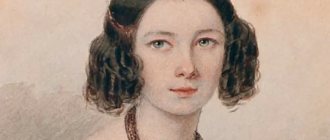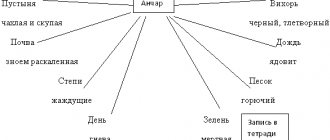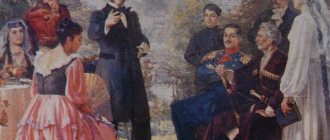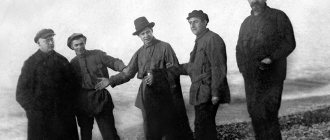History of creation
“Autumn” refers to the early period of M.Yu. Lermontov. The poet wrote it in the summer of 1828 - he was then 14 years old. It was published very soon - in 1829. When very young Misha created this work, he was visiting his grandmother’s estate. The approaching autumn season inspired sad thoughts - this is how the simple and short, but sincere poem “Autumn”, filled with deep emotions, was born.
Some literary scholars believe that it has not reached our time completely. The ending was probably lost because what was written on the next page was torn out.
The melancholy mood of the work “Autumn” is also due to the fact that at that moment the poet was separated from his father and in conflict with his grandmother. “Autumn” resembles a landscape elegy.
Means of expression
The author used a variety of paths.
It is worth highlighting the inversion. And also a special intonation.
Epithets
The selected epithets only enhance the gloomy mood of the lyrical hero.
- “they ate drooping”;
- “gloomy greenery”;
- “the month is dim”;
- "brave beast"
Personification
The young author also used personifications, for example:
- “leaves are flying”;
- “the month... silvers”;
- “ate... keep”;
- “the leaves are spinning”;
Some of them are part of metaphors.
Metaphors
The final two lines look sophisticated and insinuating. It is in them that Lermontov’s recognizable metaphorical nature is contained.
Another example of a metaphor: “...in the forest, drooping spruce trees keep gloomy greenery.”
Content Analysis
In 1848, the young poet studied at a boarding school, preparing to enter the university. His grandmother, concerned about her grandson’s health, insisted on periodically returning to the family estate, which was located near Moscow. There Lermontov read a lot, spent hours in solitude and long walks around the surrounding area. Not being a true connoisseur of landscapes, in the changing seasons the young poet considered a certain fatalism, the doom with which life passes irrevocably. His dejected state at that time was explained by a difficult relationship with his father, who did not want to maintain family ties.
During this period of life, a naive child becomes aggressive and impulsive. The character of the future great poet is being formed, which contemporaries noted as closed, straightforward and secretive. In the beauty of the autumn landscape, Lermontov considered not only the greatness of Russian nature, which is preparing for change, but also the response of his experiences. The poem is filled with negative epithets:
•
gloomy greenery;
•
drooping spruce trees;
•
overhanging rock.
It should be especially noted that behind the beauties of nature, blazing with the golden colors of swirling leaves, the author draws attention to the dark, dense forest.
Perhaps this is explained by the decadent mood of the author himself, showing his personal experiences, which a teenager, due to his age, cannot understand. Lermontov shows the gradual alienation of man from the harmony of nature through the image of a plowman who no longer rests in the shade of the rocks after righteous labors. Even a lonely wild animal, a child of nature, rushes to quickly hide in the thicket of the forest, away from a person whom it perceives as a possible danger.
Lermontov's youth
In 1828, the poet’s life changed completely.
His grandmother arranges for him to study at the University Noble Boarding School. It is here that the boy first acutely feels loneliness, which manifests itself in the first poems written. He selflessly tries to find friends, but every time he experiences disappointment, not finding the desired emotional response. It should be noted that in both friendly and romantic relationships, Lermontov loved not the object, but his feelings experienced towards the object even during infatuation. During these same years, a serious drama occurred in the family of Mikhail Yuryevich. The grandmother's guardianship over her grandson expires. According to the law, custody should again go to the father. Yuri Petrovich makes every effort to get closer to his son, they begin to see each other more often. However, the persuasion of Elizaveta Alekseevna and the promise of another large sum of money became the decisive factor that prompted the father to abandon Misha again. For the boy this was a serious disappointment.
Poems from that period are filled with memories, loneliness, and depression. It was in 1829 that the young poet isolated himself from society, recognized himself as special, and created a fictional world in which he lived. This year Lermontov wrote “Prisoner of the Caucasus” and “Circassians”. According to researchers, they echo the work of Pushkin.
In 1830, the young man fell in love for the first time, but the young beauty E.A. responded to his advances. Sushkova does not answer. Mikhail Yuryevich is also disappointed in love. That same year he left the boarding school and entered Moscow University.
The years of study were very intense. Lermontov reads a lot, meets young people with progressive views, and writes a lot.
Video “Memorizing the poem by M. Yu. Lermontov “Autumn” using a mnemonic table in the middle group”
Publications on the topic:
Using a mnemonic table when learning a poem about summer with children of the middle group Using a mnemonic table when learning a poem about summer with children of the middle group Goal: to memorize a poem with children using the technique.
Consultation “How to learn a poem using a mnemonic table” How to learn a poem for the Mother’s Day holiday using reference pictures. There are different methods for memorizing poems. Mnemotables.
Summary of direct educational activities on speech development “Memorizing the poem by E. Trutneva “Autumn” Goal: to teach children to memorize and reproduce the poem by E. Trutneva “Autumn” based on a mnemonic table. Tasks: Expand active and.
Abstract of educational activities on speech development for learning the poem by N. Naydenova “Our toys” using a mnemonic table Our toys using a mnemonic table Abstract of direct educational activities on speech development “Learning the poem by N. Naydenova.
Summary of a lesson on familiarization with fiction “Memorizing the poem “Autumn” by E. Trutneva” Summary of the educational activity “Memorizing the poem “Autumn” by E. Trutneva (excerpt) in the middle group. Circle "Readers". Goal: to educate moral children.
ECD for speech development “Memorizing S. Ya. Marshak’s poem “February” in the middle group Goal: to memorize S. Marshak’s poem “February” using mnemonics. Objectives: 1. To develop the ability to remember in children.
Notes on the development of speech in the middle group “Formation of grammatically correct speech, memorization of a poem” Lesson on the development of speech in the middle group Topic: formation of grammatically correct speech, memorization of Sakonskaya’s poem “Where is mine.
Lesson summary “Memorizing the poem by I. Belousov “Autumn” Goal. Help children remember and expressively read I. A. Belousov’s poem “Autumn” (abbreviated). Teach children to answer questions.
Notes for a lesson on speech development in the middle group “Memorizing the poem “A Gift for Mom”” BDOU “Child Development Center - Nyuksensky Kindergarten” Notes on speech development in the middle group Memorizing the poem Olga.
Summary of GCD “Memorizing the poem “The Young Moon is Melting” in the middle group Progress of GCD I. Motivation. Guys, listen to the riddle: I dusted the paths, I decorated the windows. She gave joy to the children and took them for a ride on a sled.







